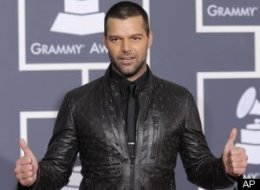Spelunking for Gayness in Glass Closets
 Ricky Martin’s decision to come out last week elicited collective yawns from many who had long suspected that the recording artist was gay, sparked rumors that Martin’s coming out was a publicity stunt designed to promote his book and jumpstart his musical career, and provoked some LGBT observers to say it was about f**king time.
Ricky Martin’s decision to come out last week elicited collective yawns from many who had long suspected that the recording artist was gay, sparked rumors that Martin’s coming out was a publicity stunt designed to promote his book and jumpstart his musical career, and provoked some LGBT observers to say it was about f**king time.
Arguing that he came out in part for his children, Martin described himself as a “fortunate homosexual man,” refusing to indulge in the drama or theatrics that we have gotten accustomed to when it comes to celebrity coming out announcements. Martin’s coming out narrative, while merely a blip on most gossip and news sites, raises some interesting issues regarding contemporary gay visibility. On the one hand, in a post-Will and Grace, Queer as Folk, and Ellen world where pop stars such as Elton John and George Michael have been out for years, Martin’s announcement hardly raises any eyebrows.
On the other hand, Martin’s coming out as a Puerto Rican gay man and as a major Latino star is a big deal. Jarrett Barrios, the president of the Gay and Lesbian Alliance Against Defamation, writes, “Gay is no longer an abstract idea, or worse, a stereotype. Now, it’s the kid from Menudo you’ve known since you were a teenager.” Billboard’s M. Ty Comer writes,“Earlier this month, Univision host Don Francisco asked another Latin artist, Eduardo Antonio, to address rumors about his sexuality. The singer responded, ‘When Ricky Martin, a man whom I admire very much, says whether he’s gay or not, that’s when I will tell you.’” Reacting to the potential implications of Martin’s decision, Michael Roston states, “I’m hoping that forces of fear who attempt to divide communities of color along the lines of those who support and those who oppose gay rights will find less and less traction for their regressive messages.” Seen in this light, Martin’s move is a small step towards ensuring greater queer visibility for gay men and women of color.
Flashing back to all the speculation about Martin’s sexuality was a big deal, however, I find myself wondering why so many of us were so convinced that Martin was gay. Why is the claim of privacy automatically interpreted as a sign of gayness? Why do we continue to search for signs of gayness as if they were given, static, or immutable? If Fred Astaire was alive today, would we all assume that he was gay because he could dance? Or, would we (and by we I mean both gay men today and society at large) be enlightened enough to realize that a man who can two-step doesn’t necessarily have a closet he needs to step out of?



“I find myself wondering why so many of us were so convinced that Martin was gay”
Gaydar and his unconvincing ‘girlfriends’.
“Why do we continue to enshrine the coming out moment as the defining moment of a gay man’s life?”
It’s a central narrative urge, though, no? That story of becoming so often preempts other stories. Hence superhero movies endlessly rebooting, hence romantic comedies ending once the couple declare their love and get married, and hence the coming out being the big moment. I agree with you, however, that there’s so much more story to be told. Why aren’t there more romcoms about partnered couples, why do superhero films struggle once they’ve told us how the hero became the hero, or why are the competition reality show winners often interesting only when they’re about to win, not after? We seem to be suffering from a pervasive narrative poverty as a culture — great at Act One, bad at the rest
That’s a fascinating–and accurate–point, Jonathan. Narrative poverty, indeed.
“If Fred Astaire was alive today, would we all assume that he was gay because he could dance?”
My students, it seems, generally assume Astaire as well as Gene Kelly was gay until I tell them otherwise; and even when I do inform them, they’re still skeptical. (It probably doesn’t help that we’ve just watched the dream sequence from THE PIRATE, which features Kelly in “Daisy Dukes” with severely oiled-up thighs: http://www.gonemovies.com/www/XsFilms/SnelPlaatjes/ActKellyPirate.jpg.)
But I wonder if my students (and other audiences) think the same about the professional male dancers from DANCING WITH THE STARS, for example, who — in their minds, I imagine — ooze a more hardened, sexual, and conventionally heterosexual masculine representation of dance than Astaire/Kelly and their film musical partners.